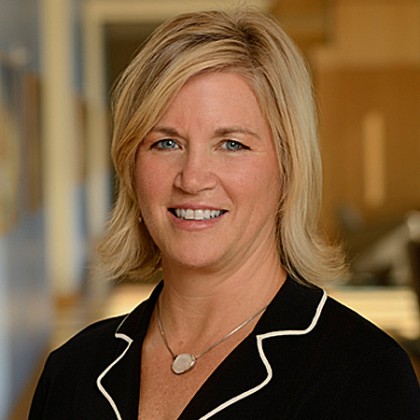In her class Design Thinking for Innovative Problem Solving, Sharon Kim starts with an icebreaker. She'll hand out common household items, such as a cardboard box, a newspaper, and a pencil, and then ask the 20 to 30 participants to brainstorm uses for the objects. Some might envision a doghouse, or a shoe bin, or maybe a child's game.
There's no prize for the best idea. Kim just wants people to think, well, outside the box. Pardon the pun. What if the group comes up with 20 different concepts? All the better, she says.
"The more variety in responses, the more creative the group, I've found," says Kim, an assistant professor in Management and Organization. "But one of the goals of this exercise is that there's not one answer. It gets them into a mode to think creatively when it comes to problem solving."
For those enrolled in Kim's classes, a problem (or three) typically needs confronting. These participants are not traditional students. They're leaders, or soon will be. Design Thinking for Innovative Problem Solving is just one of the dozens of courses currently offered by the Johns Hopkins Carey Business School's Executive Education program, aimed at those in middle management positions but open to anyone looking to sharpen his or her business acumen.
The program, launched in 2015, offers both customized seminars for groups and "short courses" for individuals in content areas such as innovation and human-centered design, health care, leadership, business communication, and management competencies. In 2017, the program started to offer executive certificates in business communication and health care leadership and management. The latter also offers continuing education credits.
Executive Education presents, on average, 40 short courses and executive certificate programs per academic year, held at the school's Baltimore campus, located in the Legg Mason Tower in Harbor East. This spring, the program will roll out five new offerings: Women in Leadership, Risk Management, Budget and Strategic Performance Measurement, Project Management, and Cross-Cultural Management.
Courses such as Design Thinking, Kim says, offer a new approach to problem solving that's inherently more creative and empathetic. Whether designing a physical space such as an office or a waiting room, or implementing a new protocol or policy, design thinking has you shape a solution with the end user in mind. For that new office space, some staff might ask for windows, others for a tall ceiling; others want art or objects to hang on the walls. "You piece this all together. What are they really asking for?" Kim says. "Maybe we can't give everyone what they want, but what do these elements all have in common? Then we can define the problem to overcome and start to think of a design that will work."
In Kim's course, participants work in teams to solve a complex problem. For example, in one class she presented a design challenge for reimagining Baltimore's "Rethink your drink" campaign, which was aimed at reducing the consumption of sugar-sweetened beverages among the city's youth. The group focused on the target demographic. What sort of marketing would they respond to? How do we reach them? One group suggested interactive, educational exhibits that would move around the city in a "pop-up" fashion.

Image caption: Pamela Williams, assistant dean of Executive Education at Carey
Pamela Williams, assistant dean for executive education at Carey, says that courses such as these offer hands-on, practical, research-based instruction for how to better perform a business task or navigate a problem. Since the participants are working professionals whose time away from work may be limited, the courses don't run more than three or four consecutive days, with all the subject matter condensed.
Glen Steinbach, senior associate dean for finance and administration at Carey, says the school wanted to offer something unique in this growing field of professional education.
"We asked ourselves, How could we take the assets we have at this school-a great faculty, a great location, and a track record of educating people-and turn that into something widely appealing to midlevel managers and those moving up to executive positions?" Steinbach says.
The program helps address the need for "stackable education," Steinbach says, referring to the concept of adding on to an MBA or other graduate-level degree that might be 10 or more years old. Many employers, when looking to promote or hire, will want to see that this person kept his or her education current, he says.
"Quite frankly, that MBA from 20 years ago is somewhat out-of-date now. Things are changing so fast," he says. "How we do marketing today versus 20 years ago is 100 percent different. You need to keep your credentials current, and it's short courses like this that enable you to do that. This is all about enabling midmanagers to develop their skills and prepare themselves to either do their current job better or step into a new job."
While the program targets the business community in the Baltimore-Washington metropolitan area, the majority of participants to date have been Johns Hopkins staff and faculty who seek personal development. Full tuition remission is available for JHU employees, and JHHS employees receive 20 percent off registration cost.
A faculty member or research scientist moving into a director or lab management position may not have a financial or budgeting background, so a course such as Finance for the Non-Financial Manager can offer tips on financial statement analysis, investment opportunities, and capital budgeting.
One of the program's more popular courses to date has been Strategic Negotiation, taught by Brian Gunia, an associate professor at Carey whose research has appeared in academic journals and popular media outlets such as The Economist, The Wall Street Journal, and Forbes magazine. Steinbach points out that we negotiate every day with co-workers, clients, and others; what we might lack, however, are the strategy and psychology expertise to negotiate most effectively. Attendees in this course participate in interactive and increasingly complex negotiation exercises to practice their skills. They learn to cope with win-lose situations, and to find those win-win opportunities.
"Sometimes people will lay a stake in the ground prematurely. I'm going to ask for this," Steinbach says. "What about sitting back and listening first? You're looking for outcomes. What are the outcomes? Everyone can learn something in a course like that, whether you have to negotiate with a boss, a vendor, or your spouse. These skills come in handy."
Williams says that while the courses are rooted in research and empirical evidence, they are more experiential than academic. To drive home points, the instructors use case studies and group exercises rather than death by PowerPoint.
Most courses are taught by a Carey faculty member and supplemented with guest speakers who are often industry experts. To make the content relevant to most of the class, instructors will send out surveys or otherwise prescreen the roster to better understand the background of everybody and level the playing field.
"This is not a class where you get to learn things about [the participants] over the term-you have one or two days to get to know your audience and learn what they bring to the table," she says.
Williams says that the course offerings are based on market demand and the latest trends. "We are constantly reinventing ourselves in terms of course offerings. And re-offering the popular ones," she says.
To complete an executive certificate, registrants "bundle" short courses. The executive certificate in business communication, for example, consists of three courses-Persuasive Communication, Effective Workplace Presentations, and Powerful Public Speaking-of three days each.
The program also offers custom programs for a department or office that wants its management team to bone up on a concept such as communication.
The program has had nearly 1,000 participants to date, with a quarter of those registered for two or more courses. With increasing demand, there are plans to expand to the school's Washington, D.C., campus in Dupont Circle, and to also offer online courses.
"We are growing solidly. The word is out that this is a quality program," Williams says. "There's a lot of energy and buzz in these classes. It's not like you're going to school. It's active. It's innovative and transformational. The best part, what you learn you can apply the very next day."
Among the upcoming courses are Cross-Cultural Negotiation (Feb. 28-March 1), Risk Management (April 26-27), and the Executive Certificate in Health Care Leadership and Management (May 10-12 and 18-19).
To learn more about the program and to register for a course, go to carey.jhu.edu/exec-ed.
Posted in News+Info, Benefits+Perks, Tools+Tech








